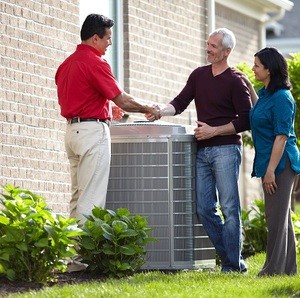Learn the Secret to Buying the Right Air Conditioner
 These days, there are so many AC units out there, that choosing the right one can be confusing and a challenge. It all begins with the basics. Does your New Jersey home require a central HVAC unit or maybe a ductless unit? From there, other options must be taken into consideration. With so much to consider, consumers can easily become overwhelmed. A little planning before making a purchase can easily save time, energy, and money. Below, our HVAC experts have put together a quick guide with tips on buying the right air conditioner for your home.
These days, there are so many AC units out there, that choosing the right one can be confusing and a challenge. It all begins with the basics. Does your New Jersey home require a central HVAC unit or maybe a ductless unit? From there, other options must be taken into consideration. With so much to consider, consumers can easily become overwhelmed. A little planning before making a purchase can easily save time, energy, and money. Below, our HVAC experts have put together a quick guide with tips on buying the right air conditioner for your home.
A Quick Guide to Those Mysterious HVAC Letters
Contents
While choosing the right air conditioner, most consumers won’t be savvy with all those series of letters (and they’re not expected to be). Bobvilla.com deciphers several of these mysterious sets of letters.
- SEER is the seasonal energy efficiency ratio, a measurement of an A/C unit’s efficiency.
- Then there is BTU, the British Thermal Unit. This indicates how effectively and quickly a unit can cool a room.
- The EER, or energy efficiency ratio, is closely tied to electric bills. This figure reveals how efficiently any given unit operates.
3 Things to Consider When Choosing the Right Air Conditioner
1. Size definitely matters.
The first thing to consider is what the AC will be used for and the size of the space it needs to cool. You might assume that a large central air conditioning unit is the way to go; however, oversized air conditioners are not necessary for most homeowners. A unit that is too large and only runs in short bursts can reduce the air quality of the home. The tendency for such units to turn off and on with great frequency is also detrimental to electric bills.
2. Consider the room environment and how many people may occupy it.
Aside from the square footage being cooled, the room environment is another important consideration. Heavily shaded rooms may require a smaller ductless unit than rooms with many windows and lots of sunlight. If using a unit to cool the kitchen, something with a larger capacity (roughly 4,000 BTUs), is the best choice. One must also think about how many people will regularly be using a room. If more than two, an addition 600 BTUs is important for each additional person. Another consideration is whether or not rooms are permanently connected by open entryways.
3. Compare models for proper efficiency.
Energy efficient units are often more expensive than their less productive counterparts. However, the savings on utility bills will make this well worth the purchase. A high-efficiency AC unit can save consumers between 10-40% on utility costs. Because the amount of savings is contingent on climate, home size, and proper sizing of the HVAC unit, it is extremely important to compare models when choosing the right air conditioner. With proper maintenance, the right unit will serve a home for years to come.
A Reputable Heating and AC Installation Service
Founded in 1906, Point Bay Energy Heating and Cooling provides air conditioning, heating, installations, and home heating oil. With a 24/7 emergency service, Point Bay Energy is here to address consumer needs at any time.
